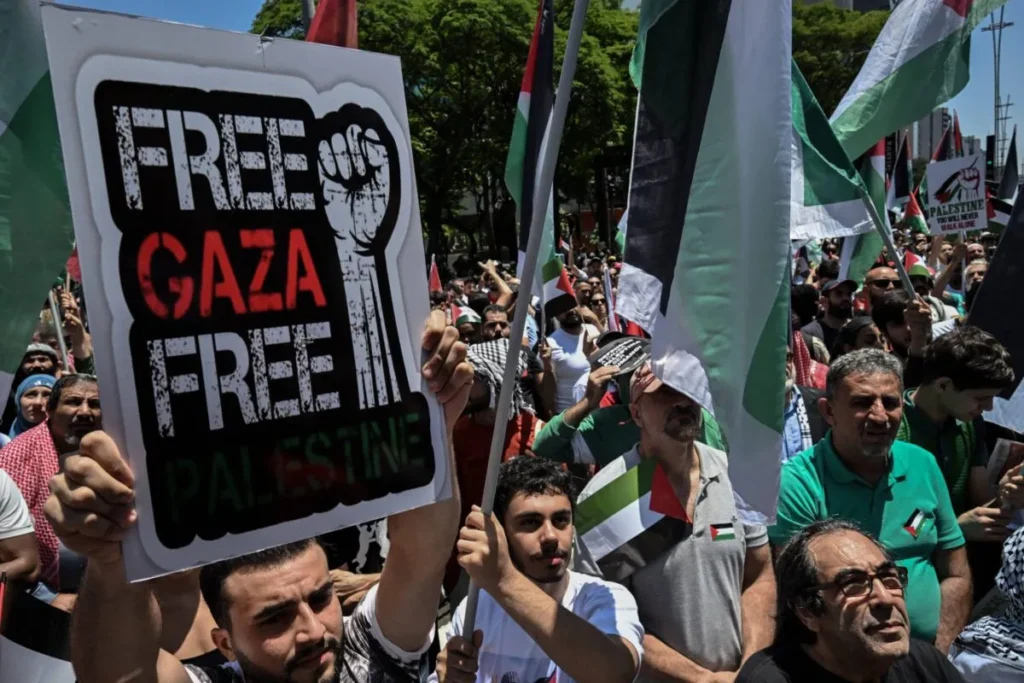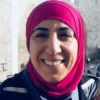‘A World without Borders’: Revolutionary Love and Solidarity for Palestine
INDIGENOUS RIGHTS, 22 Jul 2024
Samah Jabr, MD | Middle East Monitor - TRANSCEND Media Service

People take part in a demonstration against Israel’s military offensive in the Gaza Strip in São Paulo, Brazil, on 22 Oct 2023. [NELSON ALMEIDA/AFP via Getty Images]
16 Jul 2024 – “A World Without Borders”, read the tattoo on the arm of one of the Brazilian activists who stood with me and my Palestinian friend at the São Paulo Airport, bidding us farewell before our return flight. When unexpected challenges arose, the Brazilian activists stayed with us for hours, helping to resolve the issues. Even when we were denied access to our flight that night, they ensured that we had a place to sleep and continued to handle the logistics while we rested. This affectionate support exemplifies the solidarity I encounter around the world. For someone transitioning from the hostility of the occupied land, such experiences are like an emotional thermal shock.
A world without borders, racism and political violence is a collective dream, connecting stateless Palestinians with many people worldwide in what can be called revolutionary love—a love that is not declared, but deeply felt in the hands that connect, the hearts that heal and the minds that envision a world where freedom and equality are inherent rights for all.
Revolutionary love manifests in small, everyday actions: the teacher in a refugee camp providing hope to children who have known only violence; the artist who tells stories of the resilience of a forgotten people; the ordinary citizens boycotting products that contribute to oppression and supporting fair trade and ethical businesses. Each of these actions contributes to a larger movement of solidarity and liberation.
Revolutionary love is not just an abstract concept. It is a transformative force that challenges the status quo and fuels the fight for justice, equality and human dignity. It is the courage to love beyond visible and invisible boundaries, to empathise with those whose suffering is often silenced and normalised and to act in solidarity with their struggles. It is the energy that allows us to stand up and make sacrifices for one another.
Remember the story of Rachel Corrie, an American activist who stood in front of Israeli bulldozers to protect Palestinian homes from demolition. Her ultimate sacrifice of life itself exemplifies revolutionary love, demonstrating a willingness to face immense personal risk for the sake of justice. Or think of the countless medical professionals from around the world who volunteer in Gaza, providing critical healthcare amid bombings and blockades. Their acts of service, driven by deep empathy and commitment to human dignity, transcend national, religious, ethnic and cultural divides. Watch students facing police violence in campus encampments in North America and Europe. Read about Zionist groups like Canary Mission and pro-Israel leagues threatening people’s jobs and jeopardising their institutional standing for speaking up for Palestinians.
Unlike paid missionaries who join Israeli army’s genocidal war in Gaza for a few thousand Euros per week and the bribed journalists and influencers who spread anti-Palestinian propaganda, we see activists who stand beside Palestinians. They raise their voices in tireless advocacy against genocide. They offer daily support to those who refuse to succumb to despair, despite relentless adversity. They receive no money for these principled acts and, indeed, often must pay a price themselves for their commitment, through suffering tangible and intangible losses.
The call for international solidarity with the Palestinian people is rooted in revolutionary love. It is reciprocal, even when Palestinians’ hands are tied and we cannot extend them to our comrades in equal measure. For decades, Palestinians have been immersed in personal and collective hardships, our lives subject to relentless scrutiny and control. Yet, amid this darkness, the feeling that we are connected to a wider human community has not perished. I remember Palestinian public employees contributing a small percentage of their salary to Syrian refugees on several occasions. Similarly, Palestinians demonstrated in solidarity with the Turkish people who lost their lives protecting their democracy in 2016 and demonstrated in support of the oppressed Rohingya people in Burma. In Gaza, I witnessed people collecting money to support the survivors of earthquakes in Turkiye and Syria, as well as the victims of flooding in Libya. Palestinian health and mental health professionals, as well, have participated in support missions to several crisis areas worldwide. It is a testament to the strength of revolutionary love that Palestinians continue to strive for connections with indigenous, Black and other marginalised communities.
OPINION: The Zionist entity is in a strategic impasse due to its failure to achieve its declared goals
I believe that human beings have an innate need for justice and empathy. This is my understanding of “fitrah”, translated as “original disposition”, in Islamic faith. When we witness suffering, our capacity for empathy compels us to act. This is not merely a moral obligation but a psychological imperative that connects us to our shared humanity. Revolutionary love taps into this deep-seated need, urging us to break down the learned barriers of indifference and prejudice that often divide us.
Supporting the Palestinian struggle is about recognising and affirming the humanity of a people who have been dehumanised for far too long. The Palestinians find themselves at the climax of a clash of civilisations, challenging not only Israel, but a unipolar and deformed world order, where human dignity and rights are divided unevenly. This deformed world presents us with ambiguous and illusionary borders between Occident and Orient, the global North and the global South. In this corrupt world order, the Israeli Occupation sitting on our chests is considered to be very European, Western and civilised, while we are viewed as barbaric and dehumanised savages.
Palestinians dare to push Israel off our chests and, in doing so, challenge White supremacy and the Western world order. We should not be alone is doing so. A world that claims to regret Black slavery and the eradication of the indigenous people in the conquest of new continents should be in solidarity with Palestinians. Revolutionary love means seeing your ancestors in our eyes, hearing their voices in our cries. Revolutionary love is about understanding that Palestinian pain is universal and that our dreams are legitimate and human. It is about acknowledging our right to push away the heavy weight on our chest, to breathe and to connect as equals.
International solidarity with the Palestinian people means amplifying our voices, supporting our rights and standing with us in our defence of our common human dignity. As the poet, Samih Choukeir, puts it: “If my voice fades, your throats will not”, emphasizing that the collective spirit of solidarity will continue unabated in the struggle for justice. It means educating oneself and others in Palestinian history and current realities. Possessing this knowledge makes plain the similarity between our struggle and that of other native and colonised nations. This knowledge prepares us for challenging harmful narratives and advocating for global political change to promote human rights for all.
By embracing revolutionary love, we affirm that the struggle to end the Occupation of Palestine is a struggle driven by love for humanity, not hate—contrary to what our enemies falsely claim. It is a call to action, urging people of the world to stand together, not as passive bystanders but as active participants in the fight for justice. In doing so, we not only honour the Sumud and the courage of the Palestinian people, but also uphold the values that define our shared human experience: compassion, justice and unwavering love.
In supporting the Palestinian people, you not only aid our struggle, you enrich your own lives by connecting with a deeper sense of purpose and humanity. Revolutionary love teaches us that our fates are intertwined, that justice for one is justice for all. A world without borders—let us answer this call with open hearts and determined spirits, standing together in defence of human dignity and enduring peace.
_________________________________________________
 Samah Jabr, MD is a psychiatrist and psychotherapist, head of the Mental Health Unit, Palestine Ministry of Health; and assistant clinical professor, George Washington University, Washington DC, USA. She is also the author of Derrière les fronts (Behind the Frontlines).
Samah Jabr, MD is a psychiatrist and psychotherapist, head of the Mental Health Unit, Palestine Ministry of Health; and assistant clinical professor, George Washington University, Washington DC, USA. She is also the author of Derrière les fronts (Behind the Frontlines).
Go to Original – middleeastmonitor.com
Join the BDS-BOYCOTT, DIVESTMENT, SANCTIONS campaign to protest the Israeli barbaric genocide in Gaza, illegal occupation of the Palestine nation’s territory, the apartheid wall, its inhuman and degrading treatment of the Palestinian people, and the many thousands of Palestinian men, women, elderly and children arbitrarily locked up and tortured in Israeli prisons.
DON’T BUY PRODUCTS WHOSE BARCODE STARTS WITH 729, which indicates that it is produced in Israel. DO YOUR PART! MAKE A DIFFERENCE!
7 2 9: BOYCOTT FOR JUSTICE!
Tags: Gaza, Genocide, Hamas, Israeli occupation, Massacre, Palestine, Palestinians, Solidarity, West Bank, World
DISCLAIMER: The statements, views and opinions expressed in pieces republished here are solely those of the authors and do not necessarily represent those of TMS. In accordance with title 17 U.S.C. section 107, this material is distributed without profit to those who have expressed a prior interest in receiving the included information for research and educational purposes. TMS has no affiliation whatsoever with the originator of this article nor is TMS endorsed or sponsored by the originator. “GO TO ORIGINAL” links are provided as a convenience to our readers and allow for verification of authenticity. However, as originating pages are often updated by their originating host sites, the versions posted may not match the versions our readers view when clicking the “GO TO ORIGINAL” links. This site contains copyrighted material the use of which has not always been specifically authorized by the copyright owner. We are making such material available in our efforts to advance understanding of environmental, political, human rights, economic, democracy, scientific, and social justice issues, etc. We believe this constitutes a ‘fair use’ of any such copyrighted material as provided for in section 107 of the US Copyright Law. In accordance with Title 17 U.S.C. Section 107, the material on this site is distributed without profit to those who have expressed a prior interest in receiving the included information for research and educational purposes. For more information go to: http://www.law.cornell.edu/uscode/17/107.shtml. If you wish to use copyrighted material from this site for purposes of your own that go beyond ‘fair use’, you must obtain permission from the copyright owner.
Join the discussion!
We welcome debate and dissent, but personal — ad hominem — attacks (on authors, other users or any individual), abuse and defamatory language will not be tolerated. Nor will we tolerate attempts to deliberately disrupt discussions. We aim to maintain an inviting space to focus on intelligent interactions and debates.